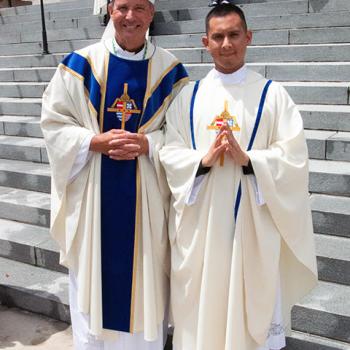"Hearing catechists working with the Deaf mustn't be prideful," Baum asserts. "They need help, they need to delegate; they need to put the Deaf to work. Deaf people have their own ways of signing, their own individual ways of expressing themselves." Providing a ready example, she describes a situation in which Maria, who is preparing for Confirmation, was having trouble understanding the concept of "saints." Baum enlisted three deaf colleagues to help out via videophone, and now each of them stays in touch with Maria, describing and explaining the lives of various saints. It is going well. Maria is still deciding who her Confirmation saint will be, but she favors St. Joan of Arc.
"The Deaf are the best people to teach the Deaf," Baum continues. "We're trying, but we've got to get deaf leaders who are well-catechized and encourage them to seek ongoing catechesis, just as we do. We need to encourage the Deaf to lead."
Addressing attributes of deaf culture that contribute to their isolation, Baum says, "They have been up against a lot of barriers, socially, so many prefer only to socialize with other Deaf. Once I was at a gathering and my friend Jack, who is deaf, wanted to introduce me to a woman who was there. He signed to her and she didn't even look at me; she looked only at him. I watched her ask him, 'Is she deaf?' And when he said, 'No,' she turned away and ignored me."
If this seems an extreme response, consider this anecdote, which Baum heard from colleagues who attended a recent annual conference of the NCOD. "One of the speakers was a CODA—a child of deaf adults—a hearing woman raised by parents who were both deaf from birth. Her first language was sign language. Once she was signing to a gathering of deaf adults, and her parents were there. At a certain point, her father rose and started signing to the audience because his daughter wasn't getting through to them. Even having signed all her life, because she was hearing and not deaf, she was not fully communicating."
"No matter how good your signing skills," Baum underlines, "the Deaf sign from their innermost being and a hearing person can only go so far. We absolutely need more interpreters, but even more, we need deaf catechists."
I hope to have more on this topic next week. I'd like to recommend a few great resources:
- Father MD is a priest who vlogs, presenting lessons in our faith performed in American Sign Language. Even if you don't understand signing, they are beautiful and fascinating to watch. Nancy watches Father MD's videos to improve her signing skills as well as to grow in her faith.
- The National Catholic Office for the Deaf is a very good site devoted to sharing resources for Deaf catechesis.
- The National Catholic Partnership on Disability is a terrific place to find resources for special-needs catechesis in both English and Spanish. For Deaf Ministry, click on "Ministries/Programs," then on "Ministry Specific," and then "Deaf/Hard of Hearing."
God bless you!





